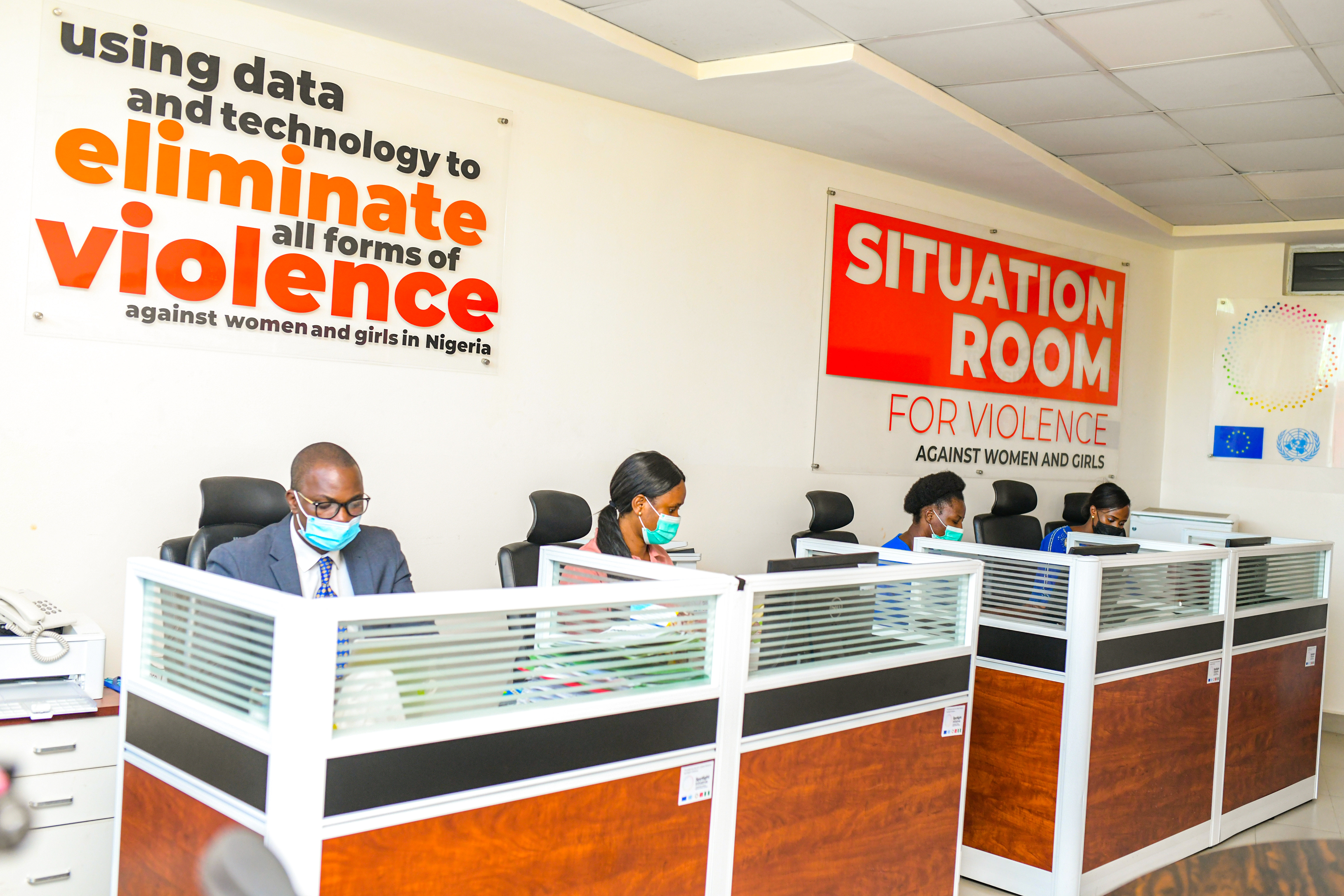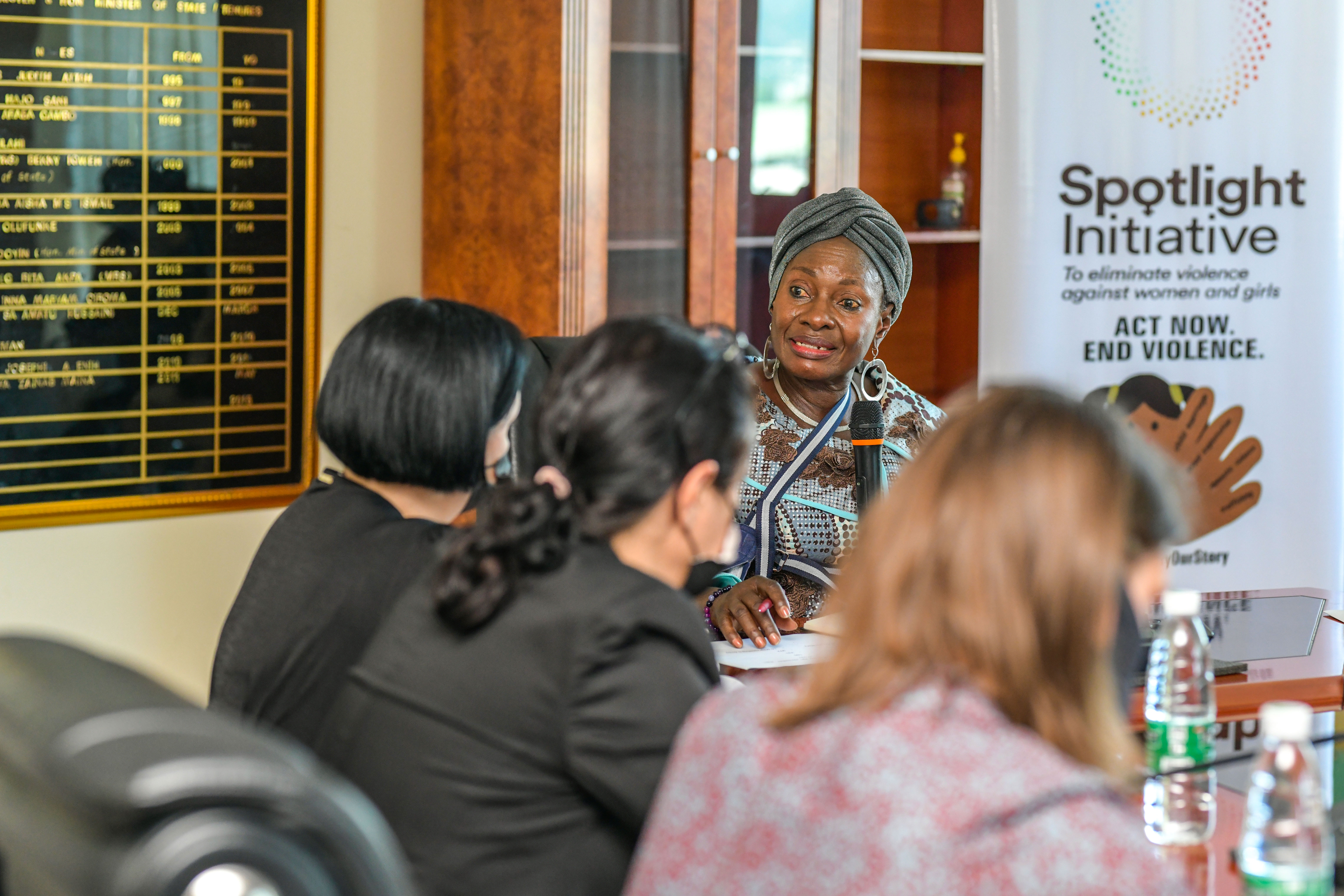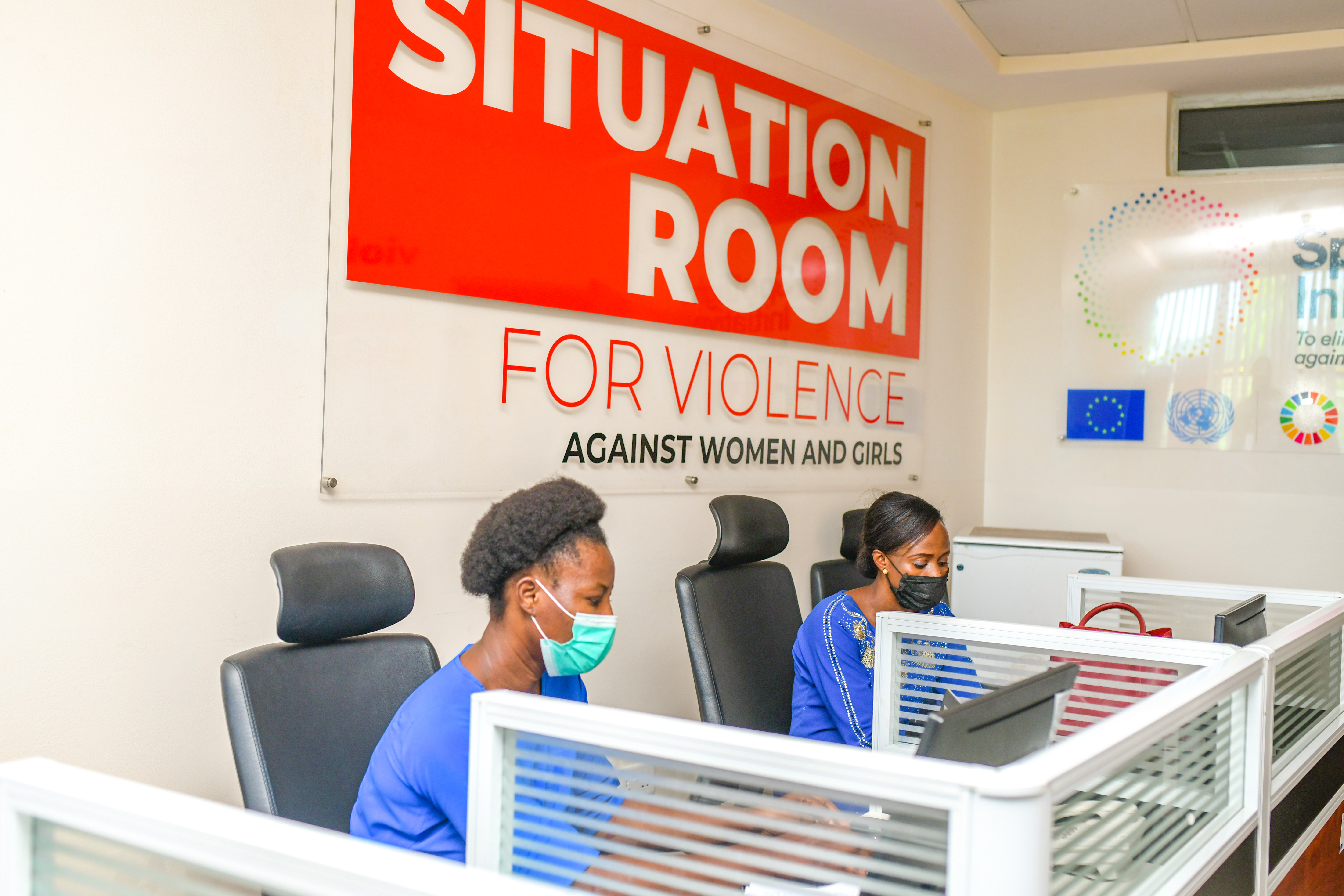Harnessing the Power of Data for Gender-Based Violence Prevention and response in Nigeria
June 30, 2022

National GBV Data Situation Room
Violence and harmful practices against women and girls happen every day in Nigeria, and most of the time they are not reported. The Nigerian Demographic and Health Survey (NDHS) 2018 found that 9 percent of women aged 15 to 49 had suffered sexual assault at least once in their lifetime and 31% had experienced physical violence. Restrictions and implications from the COVID-19 pandemic last year added to the escalation of gender-based violence (GBV) in the nation.
Since its implementation began in 2019, the EU-UN Spotlight Initiative has exerted enormous effort with productive outcomes. Despite obstacles like COVID-19, which worsened an already severe situation, one of the initiative's noteworthy successes has been the establishment of a National Gender-Based Violence (GBV) Data Situation Room and dashboard for prevention and response to Gender-Based Violence (GBV) in Nigeria.
Gaps Identified
In order to identify gaps in Gender-Based Violence (GBV) reporting, the United Nations Development Programme (UNDP) started a national landscape analysis of Violence Against Women and Girls/Harmful Practices data, as well as surveys and maps of all Gender-Based Violence (GBV) data reporting mechanisms currently in use. To comprehend the underlying norms and behaviors that support Violence Against Women and Girls/ Gender-Based Violence and restrict women's and girls' access to Sexual and Reproductive Health and Right (SRHR) and GBV services, including legal, justice, and health services, UNDP also conducted perception surveys and behavioral studies.
In addition, several in-depth consultations with national and sub-national government partners, important stakeholders, technical review sessions with subject matter experts, and other UN organizations took place. The Hon. Minister of Women Affairs, Dame Pauline Tallen, commented on the situation, stating that; "Fragmentation of tools for Gender-Based Violence (GBV) data reporting, poor coordination, absence of a harmonized platform for reporting, and lack of capacity to manage Gender-Based Violence data were key issues that were identified as responsible for the paucity of real-time data for Gender-Based Violence programming, policy, and decision-making in Nigeria."

The Hon. Minister of Women Affairs, Dame Pauline Tallen,
Also speaking about the data challenges, Mr. Agbabiaka, the GBV Data Manager for the National GBV Data Situation Room said, "before the situation room and data dashboard were established, the Ministry's method of data collection was a paper-based data collection template, a manual collation and aggregation of data which was then published in the Gender Statistics book for dissemination to stakeholders.”
The results and analysis made it abundantly clear that an evidence-based strategy was required to address Gender-Based Violence, with data harmonization serving as a crucial first step to guaranteeing a successful response. All current data management systems for Gender-Based Violence/Violence Against Women and Girls (GBV/VAWG) in Nigeria were to converge into a single, unified database and dashboard.
Establishment of National Gender-Based Violence (GBV) Data Situation Room and Dashboard
The Nigerian government and UNDP EU-UN Spotlight initiative formally launched the National GBV Data Situation Room and Dashboard in November 2020 in Abuja. According to the Hon. Minister of Women Affairs, “The Situation Room domiciled in the Federal Ministry of Women Affairs has been revolutionary in the fight towards the elimination of GBV in Nigeria, the electronic Dashboard provides a platform in monitoring and evaluation of GBV incidences and service delivery in Nigeria. This has made Gender-Based Violence data analyses and information dissemination to Stakeholders easier in responding to informed preventive and post responses to Gender-Based Violence in Nigeria”.
The National GBV data Situation Room is a cutting-edge data management and visualization tool that uses technology to make GBV data easy to access and analyze for government officials, decision-makers, and program managers. The Situation Room carries out the requirements of Pillar 5 of the Spotlight Initiative Project, which is to "ensure the availability of high-quality data and usage in responding to gender-based violence." The data infrastructure for the online reporting platform is housed in the National GBV Data Situation Room, with an output for real-time data visualization to enable analytics for prompt response.
Harmonization and Sustainability Pathway
Drawing on the success story of the Situation Room, a decision was made at the 21st National Council of Women Affairs Meeting in August 2021, to upscale to the remaining States of the Federation. The Strategic Knowledge Management Technical Working Group on Sexual and Gender-Based Violence was also established by UNDP and partners to support a coordinated national response to and programming for Gender-Based Violence in order to increase the effectiveness of the National GBV Data Situation Room.
As part of the UNDP's efforts to align data systems to better cooperative analysis and targeting, it also incorporated other Gender-Based Violence indicators such as physical violence, child marriages, Female Genital Mutilation prevention and management, and harmonize data sets across Violence Against Women and Girls, Harmful Practices, and Sexual and Reproductive Health and Rights.
Results and Impacts of Data Driven Response to GBV in Nigeria
Data now guides government and other key stakeholders' preventative and response actions in Nigeria, promoting a multi-sectoral approach to GBV prevention and response.
Mr. Damilola Adenusi, a monitoring and evaluation officer with Women at Risk International Foundation (WARIF), a civil society organization that provides healthcare to female survivors and victims of Gender-Based Violence in Lagos State, commented on the effects of the National GBV data situation room "Knowing that the data from my organization is being analyzed at the federal level to be used for rapid decision-making and policy formulation has given me fulfillment in my role and contribution to the situation room”.

The National GBV data Situation Room is a cutting-edge data management and visualization tool.
The layered data validation procedure has significantly improved the reliability of the data placed on the dashboard, making reliable data available for the development of policies to end Violence Against Women and Girls.“The Gender-Based Violence Data Dashboard has addressed the lack of Gender-Based Violence data management and availability in Nigeria, greatly increased the Ministry's GBV coordination functions, and offers a model for other nations to imitate as a long-term solution in the battle against GBV” says Hon. Minister for Women's Affairs.
She adds, "This has led to better resource allocation and guidance to GBV programming and policy creation for victims and survivors in the country. Additionally, it has prompted the national synchronization of GBV indicators and the development of the first National Gender-Based Violence indicators”.
The Situation Room has led to the development of reporting structure, management information system, and positive working relationships with Gender-Based Violence stakeholders and service providers at the Federal & State Governments, Civil Societies, and implementing partners since its inception. “I thank the European Union and UNDP for making this idea a reality. It is based on leveraging technology and data to prevent gender-based violence and should be perpetuated” Dame Pauline Tallen says.
There is readily available, high-quality data for informed decisions through the National GBV Data Situation Room and dashboard (https://reportgbv.ng/ ), and this has resulted in a nationally coordinated response to GBV across the nation.

 Locations
Locations

